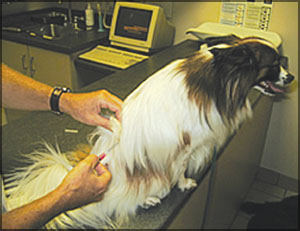Vaccination - the most important safeguard
 Remember we told you about how to find a
good veterinary surgeon for your pet and how to take better care of your
pet? Today, Dr. D.A.U. Saman Kumara,
Veterinary Surgeon of the Kirindiwela Animal Clinic describes
the vaccines you should give your pet. Remember we told you about how to find a
good veterinary surgeon for your pet and how to take better care of your
pet? Today, Dr. D.A.U. Saman Kumara,
Veterinary Surgeon of the Kirindiwela Animal Clinic describes
the vaccines you should give your pet.
When you bring home any pets, you must first check if they are
vaccinated, or make it your first task to vaccinate them. Vaccination not only helps save your pet's life, but
also your life. These vaccines help humans to avoid catching zoonosis
diseases. Now, you must be wondering what zoonosis diseases are. They
are diseases people catch from their pets.
vaccinate them. Vaccination not only helps save your pet's life, but
also your life. These vaccines help humans to avoid catching zoonosis
diseases. Now, you must be wondering what zoonosis diseases are. They
are diseases people catch from their pets.
Given here is a guide to the vaccination timetable. This can vary
from pet to pet, depending on the pet's health and condition. Your vet
will guide you through this process.
The Anti-Rabies Vaccine (ARV) can be administered even after six
weeks instead of 16 weeks, if the mother of the pups had been
vaccinated. Stray dogs should be vaccinated properly.
Vaccinating just once would not help save the pet from contracting
dangerous diseases. Annual re-vaccination is vital. Even after the pet
has been vaccinated for the first time, there is a two per cent chance
of it getting the disease; with the second dose, this chance will lessen
by one per cent, and by the third year, the pet will be safe from the
disease.
Even if the dog is vaccinated with the ARV, if you have been bitten,
don't just let it go. Observe your pet for at least 10 days.
We have mentioned in the table that there are three vaccinations
which need to be re-administered. For the ease of dog-owners, there is
also one combined vaccine for Parvo, D.H.L and A.R.V. This vaccine is
known as D.H.P.R.L (Dis temper, Hepatitis, Parvo, Rabies, Leptospirosis).
The only problem with this vaccine is it's a bit expensive. But, if
anyone wants to give the three vaccines separately, on three separate
days, it could be done. This is less expensive as well.
There are no other safeguards for serious diseases which can kill
your pet, in the absence of vaccination.
At the time of vaccination, the vet will give you a record book for
your pet; this will maintain the records of your pet's vaccinations. You
must keep this record book as proof of the vaccination. If you have any
doubts regarding your pet's vaccination, just consult your vet.
Vaccine Age Re-vaccination
Parvo At 6 weeks (first dose)
D.H.L At 8 weeks ( 2nd dose)
Parvo 12 weeks ( 2nd dose) Annually
D.H.L 14 weeks ( 2nd dose) Annually
A.R.V 6 weeks ( 2nd dose) Annually
More about vaccination later...
Janani Amarasekara |
